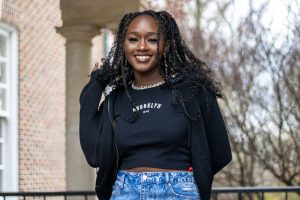
“When it comes to the narrative of the strong Black woman, it’s like (they) have to juggle ABC and be strong all the time. It’s, like, crying and being vulnerable is not accepted as much with Black women,” Yasmine Anderson, a senior Spanish major, said. “We’re expected to not crack under pressure. I think it’s hard for Black women to be soft.”
For centuries, Black women have been subjected to harmful stereotypes that impact society’s perception of them. Some include anger and dominance, while others include hypersexuality and masculinity.
For Women’s History Month, two University of Mississippi Black female students shared how these stereotypes have affected them personally, as well as what they do to deconstruct them.
Nadeia Jones, a freshman business student, said that she has been affected by masculinization and oversexualization, and that those stereotypes have caused her to change “internally and externally.”
“Growing up, I really liked girly media and hyper-feminine things. I felt that internally I equated femininity with whiteness for a long time in my life,” Jones said. “ I just felt like no matter what I did, I was never going to be this really feminine person or that lifestyle just wasn’t for me.”
Jones talked about feeling pressure to turn to Eurocentric beauty standards to feel pretty.
“When I wear my natural hair, I always feel like I have to do my makeup,” Jones said.
That isn’t the only thing that Jones felt she had to physically change about herself.
“From a young age, I dealt with body dysmorphia and eating disorders. A lot of it stemmed from the fact that my body didn’t look like other young girls. Like I wanted to be girly, but I’m just not built that way.”
She talks about always seeming “older than she was,” because she, along with other Black girls, were more physically developed than girls of other races.
When it comes to dismantling those views surrounding the lack of femininity, even though it causes her inner conflict, Jones tries to wear her hair in its natural texture to show that Black women can be feminine in their natural states.
“I am feminine. I identify as a feminine person, so I try to be myself and do what I like,” sha said. “Whether or not people think that’s feminine enough doesn’t have anything to do with me. Because I am feminine and other people will catch on to it if I put the energy out there.”
Another way that Jones does this is through her fashion style. She embraces hyper-feminine styles by wearing her favorite color, pink, and tons of glitter.
“Since I’ve had the ability to, I just decided ‘Hey, (this style) isn’t for this one group of people.’ It felt like there was a very strict thing of what we can and can’t do. So I just decided to wear what I wanted to wear and do what I wanted to do, and I felt like that would inspire other Black girls to do it too,” she said.
On the other hand, Anderson embraces her “masculine” nature, yet still finds femininity within it.
Anderson is a member of the queer community and talked about how that changes people’s perspectives on her womanhood.
“When it comes to the way that I dress, I feel like I’m more androgynous and whatnot because, you know, I am a part of the LGBT community, so that’s another thing. I’m a lesbian, but I still dress very feminine,” Anderson said.
She relates this to a label that pioneered modern-day stereotypes for Black women: the “Sapphire.”
The “Sapphire” stereotype for Black women is linked to dominance, anger and masculinity. It originated in the 1800s and has been a caricature in the media ever since. It is often described as a Black woman who is “sassy, emasculating and domineering,” as well as, “aggressive, loud and angry” by the National Museum of African American History and Culture. The “Sapphire” is a woman that takes on the roles of a man.
Many Black women have strong features like prominent cheekbones, jawlines, brow bones, big noses, broad shoulders, etc. Anderson discussed how those traits have been used to defeminize Black women.
“Serena Williams, for example. They called her a man and everything. They talked about her like a dog. But at the end of the day, that is a woman,” Anderson said.
Another example of Black female athletes being penalized for their inherent “manliness” occurred during the 2020 Tokyo Olympics, where Namibian athletes Christine Mboma and Beatrice Masilingi were not allowed to compete because of their high testosterone levels, which occurred naturally.
Like Serena Williams, Anderson is an athlete.
“I powerlift, and when you’re like a powerlifter people ask, ‘Why are you lifting so much? You’re a woman. You don’t want to look big or like a man,’” she said, “I think that it really takes away from people seeing us as human beings,” Anderson said.



























